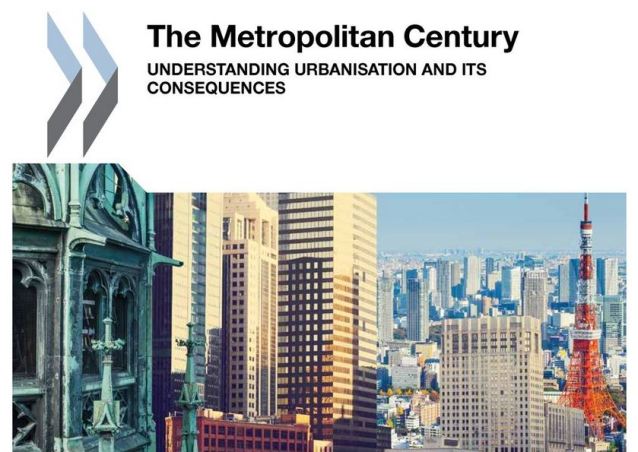
Cycling is a sign of a successful city, bike sharing could reduce air pollution says OECD
A recently published OECD report says that cycling is a sign of a successful city, bike sharing could help reduce air pollution and congestions but car use in most cities are not correctly priced. Congestion charges, speed limits could also help reduce air pollution and congestion, however because of the not correct pricing of car use transport-related policies fuel urban sprawl and driving.
 OECD/Metropolitan Century
OECD/Metropolitan Century
Cycling is one of the signs of a successful city, according to a report published this February by the Organisation for Economic Co-operation and Development (OECD). The report, titled “The Metropolitan Century: Understanding Urbanisation and its Consequences”, gives a thorough picture about recent urbanisation trends and what effects, consequences will have the rapid increase of urbanisation rate on cities, environment, economies and city dwellers.
Car use needs to be correctly priced
The report states that the distance between people's workplace and home affects the means of tranportation people use and through this process people living in cities could be environmentally more friendly. "Proximity between businesses and people's homes is likely to promote sustainable transport means like walking or cycling", says OECD. Nevertheless, the report also states that this positive sign is counterweighed by urban sprawl: in a large majority of cities, negative externalities of car use are not (correctly) priced. This implies that transport-related policies actually incentivise sprawl, says OECD.
Regarding correct pricing of car use, researchers state that "in most cases, this implies imposing higher taxes on driving into a city in order to account for so-called externalities such as air pollution and congestion."
Bike sharing: a great way of reducing air pollution
One of the elements which could help reduce air pollution and congestion according to OECD are bicycle sharing schemes that have been adapted in many cities around the world in the past years. Bicycle sharing schemes offer a fast and flexible transport option that can substitute cars for short trips. Perhaps more importantly, they also offer and uncomplicated way to start cycling for people who have not done so before. Thereby, they can contribute to an increased acceptance of cycling and help to initiate a broader shift towards it, says OECD.
Other innovative options to solve urban traffic problems are congestion charges. According to the report these ensure that motorists driving in cities pay a compensation for the negative consequences that this has for residents and other road users. It also discourages some potential road users from driving and thereby reduces congestion. To be effective congestion charges need to be sufficiently high. However, according to the OECD, the exact level depends on how motorists react to the congestion charge and has to be decided on a case-by-case basis (just introduced in peak hours or no congestion charge for low-emission vehicles for example).
Speed limits could help reduce carbon emission
In addition to the congestion charges, reduction of speed limits could also help to ease congestion and air pollution. A transport policy simulation done by OECD showed, the reduction of speed limits in the centre of Paris by an average of 6-8 km/h would reduce the modal share of cars in the Paris agglomeration by 6 percent, as well as carbon emission in order of 5,5 percent.
Want to read more about benefits of cycling on reducing air pollution and health benefits? Click here for ECF pages.
About the author
 Gergely Nagy works as a Communications Intern at ECF, he takes care of ecf.com pages, databases and is involved in several advocacy topics.
Gergely Nagy works as a Communications Intern at ECF, he takes care of ecf.com pages, databases and is involved in several advocacy topics.
- Log in to post comments
Contact the author
Recent news!
Upcoming events
Contact Us
Avenue des Arts, 7-8
Postal address: Rue de la Charité, 22
1210 Brussels, Belgium









